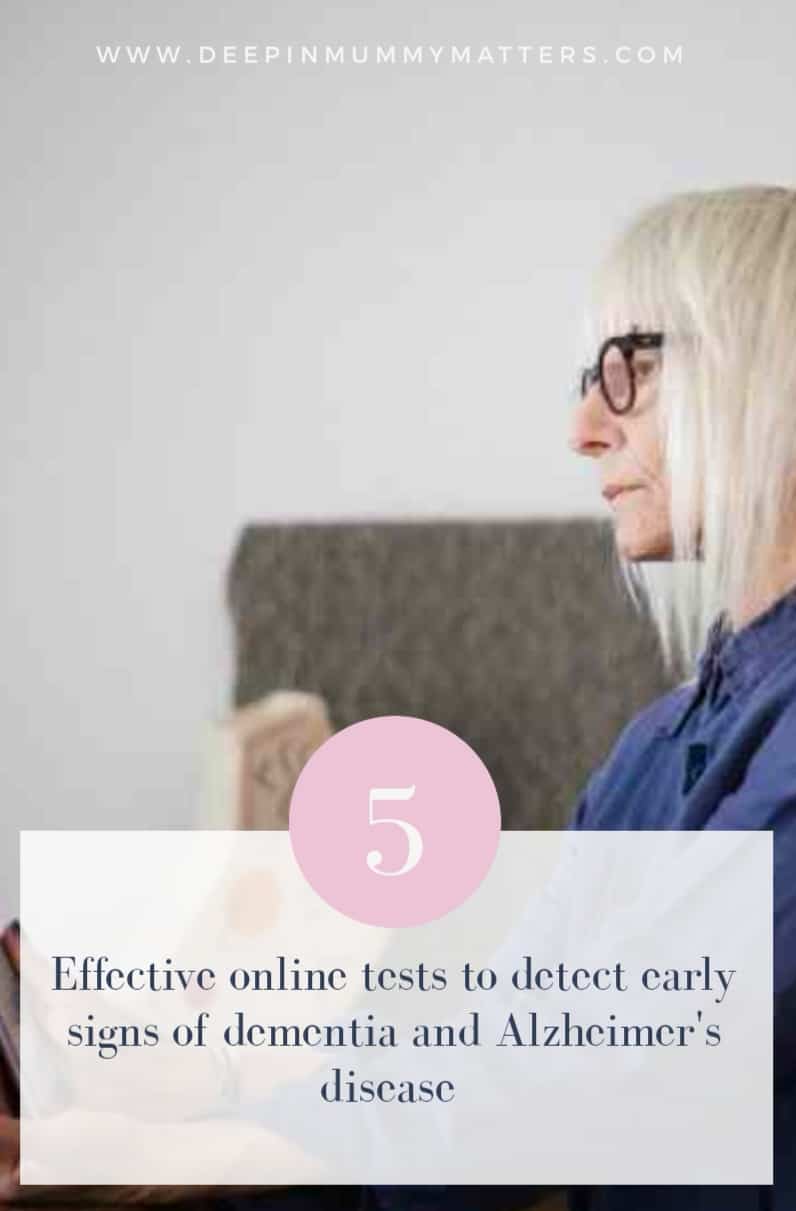As we age, our mental health can significantly decline. That’s not to say that this is exclusively a problem with the elderly though. Indeed, there are a number of children who also have complex needs and issues that may even require the help of someone like these Effective in-home care services for disabled children to give their families some extra support and specialist care. But, when it comes to the elderly, there are certain conditions that develop as a person ages. For example, nearly 7% of adults aged 60 and above suffer from dementia, a term used to describe conditions where individuals exhibit a decline in memory and other mental abilities. The most common form of dementia is Alzheimer’s. In fact, according to WebMD, about 60 – 80% of people who have dementia have Alzheimer’s.
5 effective online tests to detect early signs of dementia and Alzheimer’s disease

Cognitive impairments can directly impact everyday activities and the quality of life of the person with dementia as well as others around them. So it’s essential to know how to nurture and support people with the condition alongside the families taking care of them. We discuss 5 online tests to detect early signs of dementia and Alzheimers.
Early diagnosis is beneficial
Many companies are researching and creating products and activities suitable for those living with dementia, but early detection is necessary. People usually don’t go to the doctor earlier enough for fear of getting confirmation of their doubts.
And with the corona epidemic, people are avoiding hospitals as much as possible. However, what they fail to understand is that the delay only makes the situation worse. Often drugs and treatments work better when introduced earlier on. In fact, detecting the initial signs of dementia can allow doctors to manage treatable underlying conditions such as abnormal thyroid function or a vitamin deficiency.
Moreover, early detection is crucial for diseases like Alzheimer’s, primarily to slow down its progression. With this in mind, a range of online tests has been created to help those in doubt make sense of the situation.
Who should consider online tests for dementia
The earliest signs of dementia include:
- Difficulty in planning
- Difficulty with familiar tasks
- Difficulty in solving problems
- Problems in speaking or writing
- Losing track of time
- Getting lost
- Misplacing belongings
- Mood swings
- Social withdrawal
Anyone experiencing a combination of these symptoms should consider taking online tests to see whether further evaluation or discussing the condition with a doctor is necessary.
Online tests you should consider
You should interact with reliable online platforms that will accurately inform you about the condition. You can’t simply choose one that sounds good. So we’ve made the task easier for you.
Here is a list of online tests that can help you with early dementia and Alzheimer’s diagnosis.
1. Mini-Mental State Exam (At-Home Version)
Mini-Mental State Exam (MMSE) is meant to be administered by medical professionals alongside a complete battery of tests for dementia, including evaluation of medical history, brain scans, neurological exams, genetic testing, etc. However, it can be given to a loved one at home to help family members assess their mental acuity, which is a crucial step in diagnosing dementia.
Though the test is not given online, it can be found effortlessly downloaded from the internet and printed out. The MMSE is a fairly short and simple test, hardly taking 10-15 minutes to complete. And it’s easy to administer, requiring no special equipment or training. The 30-point test aims at measuring thinking ability by testing the following criteria:
- orientation to time and place, such as knowing where you are, and the season or day of the week
- short-term memory
- attention span
- ability to solve simple problems
- identifying common objects by name
- comprehension
- motor skills, such as drawing a slightly complicated shape
The score helps to provide an estimate of the stage and severity of dementia. And if taken regularly, it can even show how the person’s mental health has changed over time.
2. Modified Clinical Dementia Rating (CDR) Test
The modified version of the CDR test allows a family member or anyone familiar with the individual to answer questions about their mental health. It’s a short and straight-forward test, taking no more than 3 minutes to complete. And the best thing is that results are received immediately.
Even though the 6 questions by no means can provide a definitive diagnosis, it can give family members a heads up about any initial conditions that could warrant further testing.
3. Self-Administered Gerocognitive Examination (SAGE) Test

SAGE has been found to be 95% effective in detecting the early stages of dementia. The test helps to evaluate all aspects of cognition, such as language, memory, problem-solving, etc. More importantly, when repeated consistently, doctors can monitor the patient’s mental acumen and detect changes in cognitive ability. This allows doctors to start treatments earlier.
Individuals can easily find the SAGE test online, and complete it in 15 – 20 minutes. Though it can be taken to a physician for a more formal evaluation, you can easily understand the results with the aid of the scoring instructions also available online.
4. The Clock Drawing Test (CDT)
This test is exactly what it sounds like. The person is given verbal instructions to draw a clock showing a specific time, usually “10 past 11.” Though it may appear like a very basic test, it examines various aspects that people with dementia often struggle with, such as:
- Understanding verbal instructions
- Remembering what a clock even looks like.
- Coordinating multiple steps to draw a clock: drawing a circle, writing the numbers in the correct places, and finally, the hands.
- Abstract thinking: deciphering that “10 past 11” means the minute hand is pointing toward the 2 and the hour hand is at 11.
The Alzheimer’s Association says that a normal clock indicates an absence of dementia. However, an abnormal one suggests further testing is recommended.
5. Mini-Cog
The Mini-Cog is a concise test that any healthy adult can administer. It requires a person to listen to three unrelated words, draw a clock (the clock test mentioned above), and then repeat the three words. Though simple, this test checks several levels of cognition.
One of the first signs of dementia, including Alzheimer’s, is difficulty remembering recent things. Asking the individual to recall the three words after the distraction of drawing the clock is a way of checking their short-term memory. Anyone in the early phases of dementia will find this task challenging.
Final thoughts

A number of screening tests are readily available online for people with dementia-like symptoms. Their main purpose is to highlight initial signs of a problem. However, a thorough examination by a qualified healthcare professional and further medical tests will be necessary for a complete diagnosis.
Even though they do not give a formal diagnosis, researchers hope that these online tests will provide family members with adequate information on whether further medical attention is required. Therefore, though a reliable assessment from at-home tests, you can get your loved one the appropriate care they deserve.

